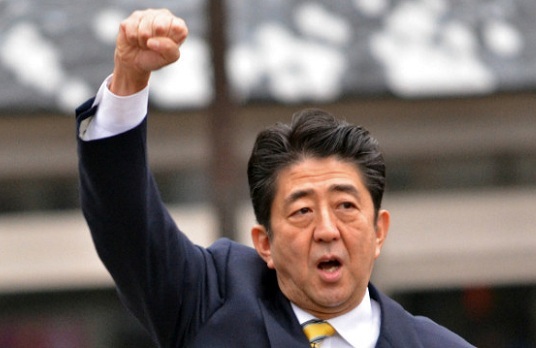Japanese premier's Central Asia tour targets much influence

By Aynur Karimova
Japanese Prime Minister Shinzo Abe's five-day tour in Central Asia with an entourage of about 50 Japanese banks, trading companies and universities, portrayed his intention to boost his country's influence in this region and drumming up business opportunities for own companies.
The fact that it has been nine years since the last Japanese prime minister visited Central Asia, and Abe was the first premier to visit Turkmenistan, Tajikistan, and Kyrgyzstan, demonstrated Japan's unprecedented level of interest in this region rich with natural resources.
During Abe’s trip to Central Asian countries, Japan signed multi-million and billion-dollar agreements at each destination. Abe inked several agreements with Turkmen President Gurbanguly Berdymukhamedov to cooperate on various projects with a total cost of $18 billion.
Japanese companies proposed to construct plants around Turkmenistan's giant Galkynysh gas field, in particular an $8 billion gas processing plant, a $4 billion chemicals plant using natural gas as feedstock and a $2 billion facility to produce urea for further use in fertilizer products. The consortium included trading companies such as Mitsubishi and Itochu, as well as plant engineers such as JGC and Chiyoda.
While in Uzbekistan, Abe announced about $8.5 billion of joint projects, including a contract for Mitsubishi Heavy Industries and Mitsubishi Corporation to construct a $1 billion fertilizer plant.
However, Japan counts to have win-win deals. Abe believes that the contracts that were signed during the visit to the region may bring up to 30 trillion yen ($250 billion) in profits to the Japanese business giants until 2020.
The Central Asian nations are currently best known for their natural resources - not only oil and gas, but also uranium, rare metals, and gold. Due to decreasing prices for natural resources, these five nations are trying to diversify their industrial base. So, this region is a good place for Japan to step in thanks to its experience and know-how exporting social infrastructure.
Japan will have to compete for influence with China and Russia in this region. As former members of the Soviet Union, the five Central Asian nations all maintain close ties with Russia. More recently, China has been cultivating strong political, financial and economic ties with each of these countries.
In this regard, experts believe that one of the important goals of Japan and the aim of this high-level fruitful visit to Central Asia is to counter China’s growing influence in the region. Tokyo is afraid to see China becoming the main player in Central Asia as Beijing promises to step up investments in the region through its New Silk Road policy.
The Japanese government is convinced that this step will strengthen Japan’s energy security as well, which will reduce its dependence on nuclear power.
Bruce Pannier, an expert on Central Asia and Senior Correspondent at Radio Free Europe/Radio Liberty, believes that Central Asian governments are likely to welcome Japan’s finance and cooperation initiative and they will be more eager to do business with Japan.
"Most of the five countries are falling deep into debt with China. Russia is not currently in a financial position to help the Central Asian states continue building vital infrastructure projects," he told Azernews on October 30. "Plus, Abe renewed support for smaller but incredibly useful projects Japan has been helping to fund for more than two decades such as water purification systems, improvements in agriculture and farming techniques, helping build schools, upgrading healthcare systems and other sectors of these countries’ infrastructure."
The expert appraised the prospects of Japanese-Central Asian cooperation as 'very good'.
"Central Asians have a good view of Japan, most consider Japan a valuable and helpful friend," he noted. "I do not think Japan will be able to compete with China economically in Central Asia, or with Russia politically in Central Asia, but Japan does give the Central Asians another influential international partner."
Central Asian nations are also interested in bringing Japanese influence in. They believe that more trade with and investment from Japan can reduce these countries' reliance on China and Russia.
With Abe's visit to Central Asia, which is emphasized by the Japanese media as “historical dimension,” there remains no doubt that Tokyo is putting a particular emphasis on the development and strengthening of relations with the countries of Central Asia.
Based on current status of circumstances, it turns that the next big moment in Japanese-Central Asian relations will become the foreign ministers’ meeting within the “Central Asia plus Japan” initiative, to be held in Turkmenistan next year.
--
Aynur Karimova is AzerNews’ staff journalist, follow her on Twitter: @Aynur_Karimova
Follow us on Twitter @AzerNewsAz
